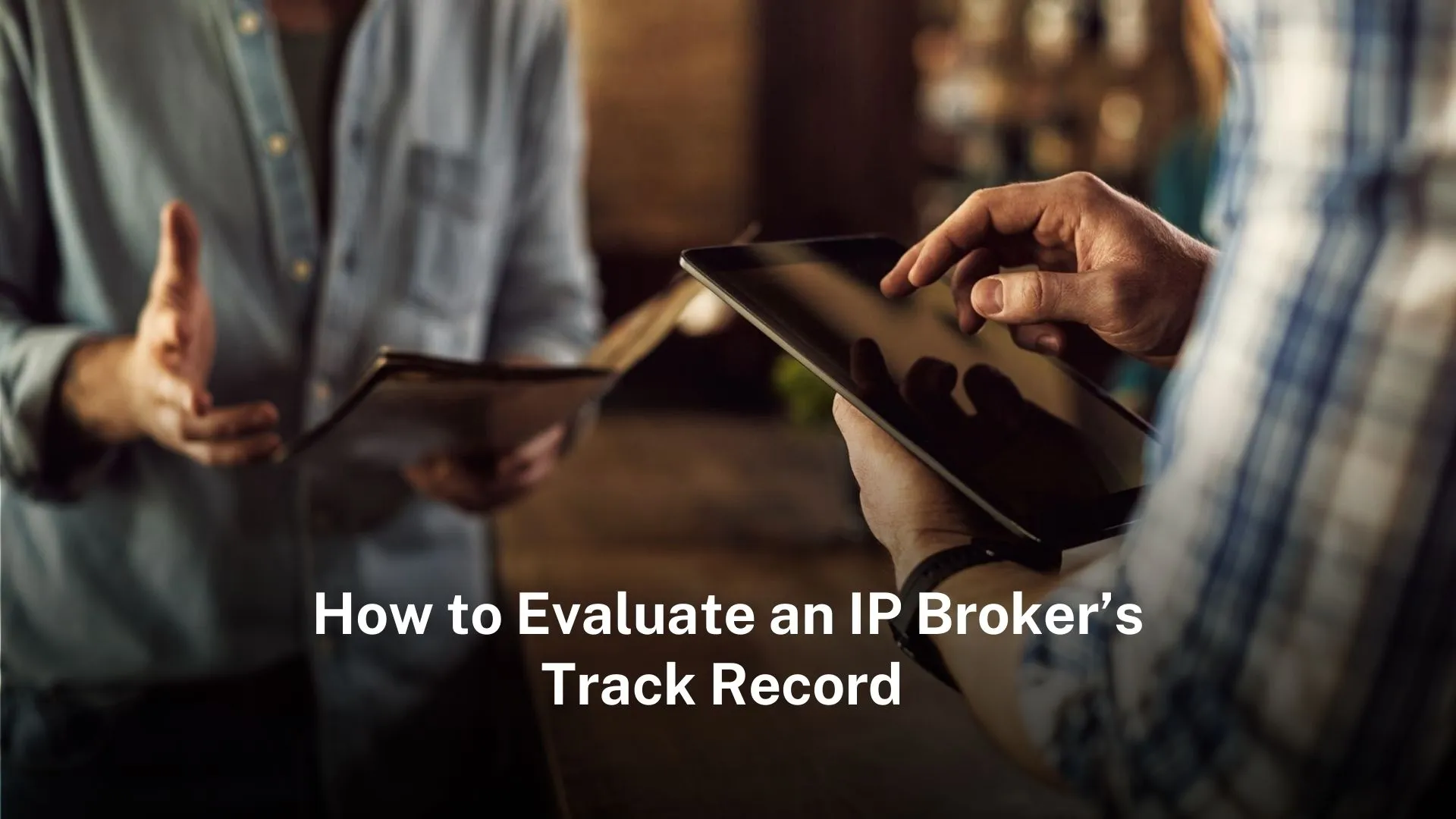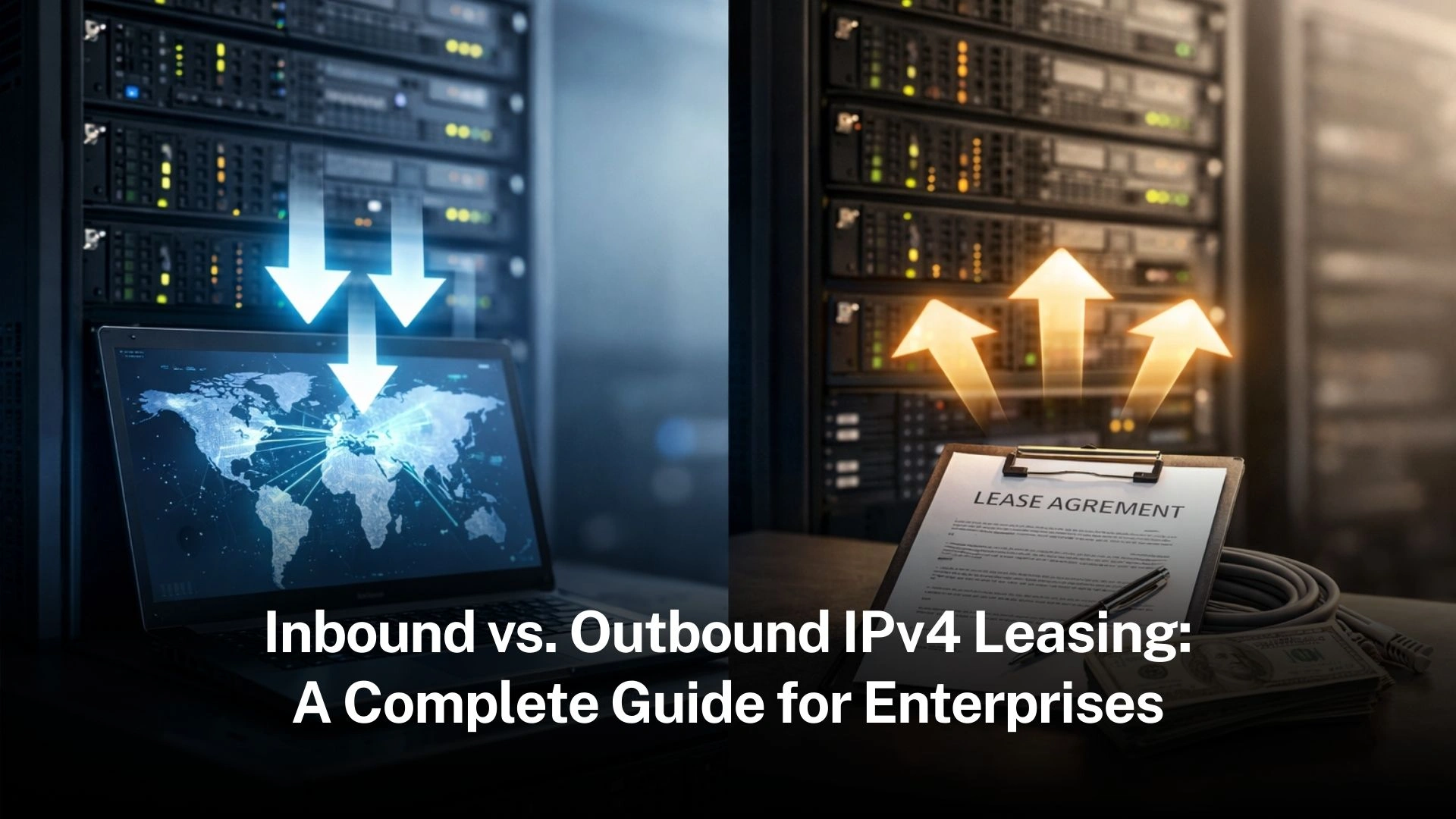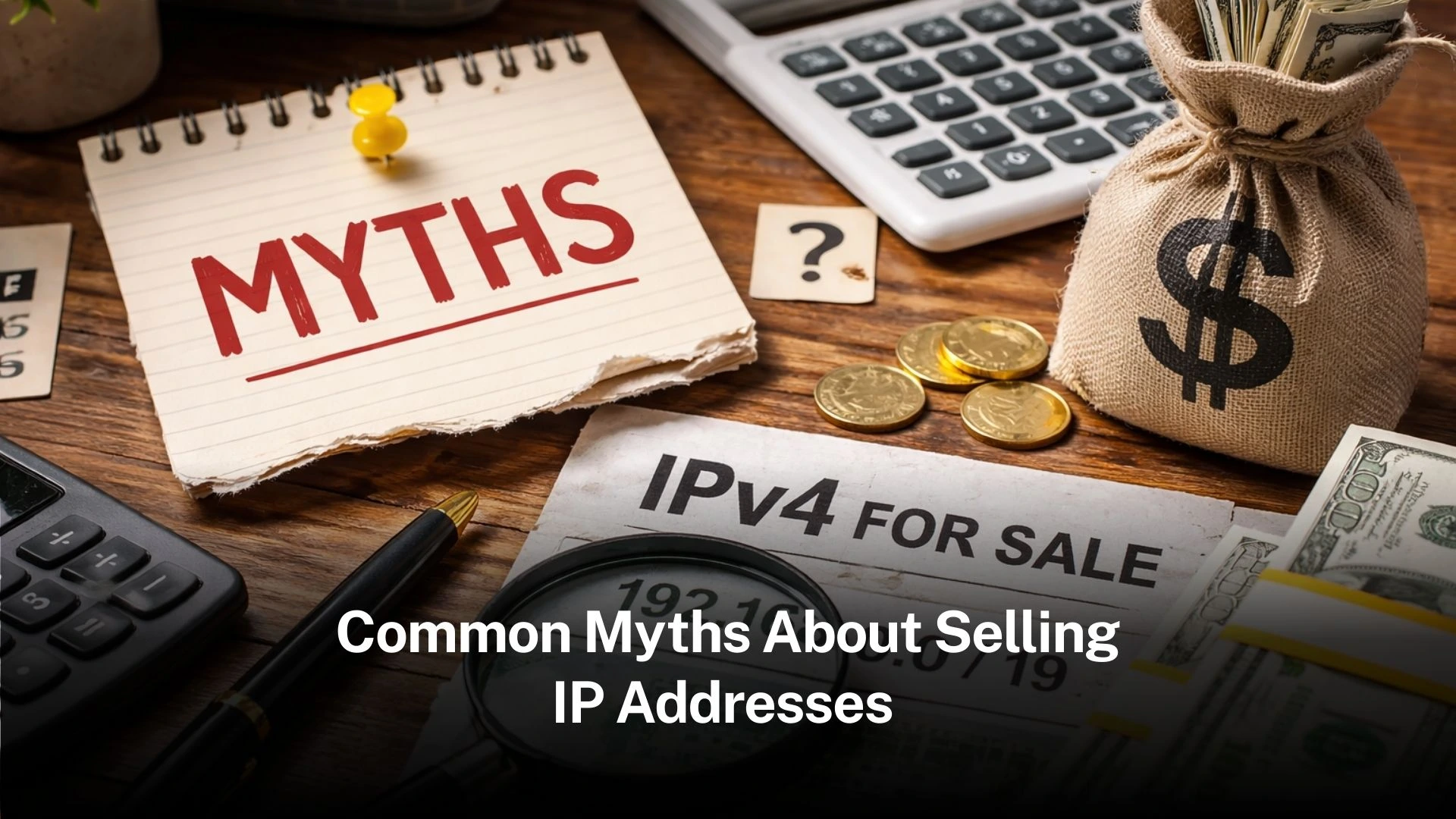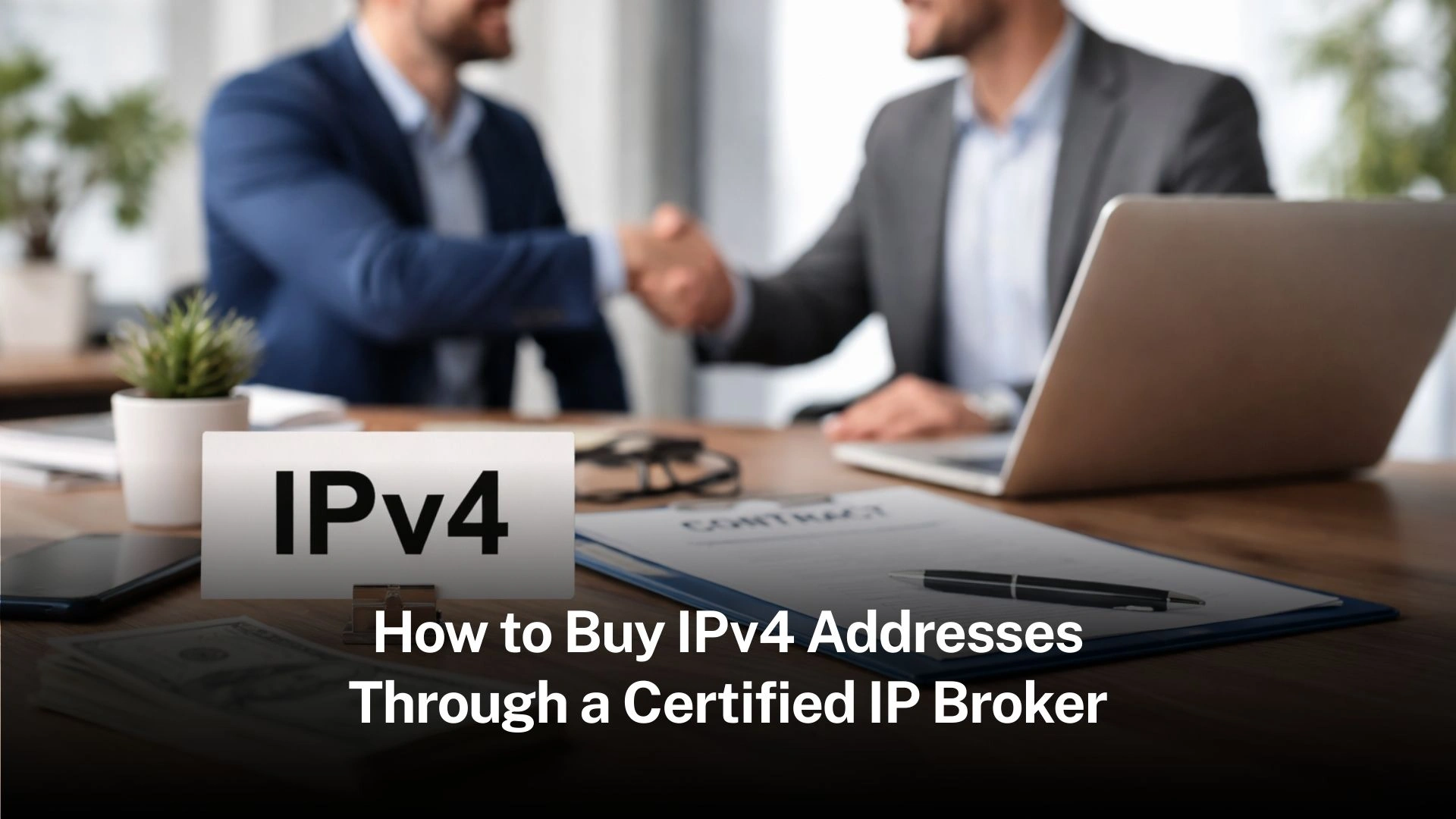How to evaluate an IP broker’s track record

1. Understand the role of an IP address broker
Table of Contents
An IP address broker acts as the main intermediary between IP holders and potential buyers, lessees, or investors. Their role is to connect organizations that need IPv4 or IPv6 addresses with those that have unused resources, ensuring a smooth and compliant transfer.
Their role includes:
Their responsibilities include:
2. Assess experience and reputation
Experience is one of the most reliable indicators of a broker’s trustworthiness. Brokers with years of completed IP address transactions have stronger networks, deeper market knowledge, and the ability to handle unexpected challenges.
- Check how long they’ve been in the market.
- Verify whether they have completed transfers in the same RIR region as your need (ARIN, RIPE NCC, APNIC, AFRINIC, or LACNIC).
- Review client testimonials, case studies, and independent feedback to gauge reputation.
3. Compliance assurance: Core competence of IP brokers
A broker must have strong knowledge of RIR policies and regulatory requirements.
For example:
- ARIN (North America) has strict requirements for ownership transfers.
- RIPE NCC (Europe, Middle East, Central Asia) requires documented justification and technical reviews.
- APNIC, AFRINIC, and LACNIC each have specific documentation and transfer rules.
Professional brokers:
- Prepare all required forms and documents in advance.
- Maintain communication with registries.
- Anticipate issues like mismatched records or technical inconsistencies and resolve them quickly to avoid delays.
4. Evaluate financial stability and transparency
4.1 Financial stability
A broker with stable finances is more reliable. If a firm is struggling with cash flow, your transaction could face delays or risks. You can:
- Request references from previous clients.
- Review public filings (if available).
- Ask industry contacts about the broker’s reliability.
4.2 Transparency
Trustworthy brokers explain upfront:
- Their fee structure and payment schedule.
- The transaction process, expected timelines, and possible risks.
Clear communication builds confidence and prevents surprises later.
5. Analyse past success and case studies
A broker’s past work shows more than their marketing claims. Review:
- Portfolio of completed transactions – consistent success across market cycles shows resilience.
- Case studies – how they solved real-world challenges.
- References – direct feedback from past clients about responsiveness and results.
- Success rate – percentage of deals completed versus abandoned, which reflects negotiation skill and market reach.
6. Consider post-transaction support and future opportunities
Reliable brokers support clients even after a transfer is complete, including:
- Ensuring RIR records are updated correctly.
- Providing guidance on compliance and dispute resolution.
- Advising on leasing, reselling, or expansion opportunities in the future.
A strong relationship with your broker can bring long-term value as IP address market conditions evolve.
Trusted IPv4 Leasing for Business Growth
Get enterprise-grade IPv4 space quickly, with seamless deployment and end-to-end management.
Get Started with i.leaseFAQs
What is an IP address broker?
An IP address broker helps organizations buy, sell, or lease IPv4 and IPv6 address blocks while ensuring regulatory compliance.
How do I check if a broker has experience in my region?
Ask for case studies and references from clients in the same RIR (ARIN, RIPE, APNIC, AFRINIC, LACNIC).
Why is financial stability important in a broker?
A financially stable broker can handle large transactions reliably without operational disruptions.
How can I ensure the broker is compliant with RIR regulations?
Ask them to explain their experience with RIR transfer policies. They should demonstrate clear knowledge of documentation and processes.
What should be included in a broker’s contract?
The contract should clearly outline:
- Scope of services
- Fee structure
- Timeline
- Confidentiality clauses
- Termination terms
Related Blogs
Related Posts

Inbound vs. Outbound IPv4 Leasing: A Complete Guide for Enterprises
Understanding IPv4 leasing helps enterprises manage scarce address space, reducing risk and unlocking strategic growth opportunities in today’s digital economy. Key points Distinguishes between inbound (leasing in) and outbound (leasing out) IPv4 approaches and their strategic implications. Highlights contract structures, registry risk management and continuity considerations affecting global number resources. Inbound vs. outbound IPv4 leasing: complete enterprise guide In the post-exhaustion era of Internet Protocol version 4 (IPv4),Read more Related Posts Inbound vs. Outbound IPv4 Leasing: A Complete Guide for Enterprises Understanding IPv4 leasing helps enterprises manage scarce address space, reducing risk and unlocking strategic growth opportunities in today’s digital economy. Key Read more Common Myths About Selling IP Addresses The IPv4 secondary market is often shrouded in mystery, leading many organizations to sit on valuable digital assets because they Read more How to turn idle IPv4 addresses into a recurring revenue stream with iLease Unlock the hidden value of unused IPv4 addresses with iLease, turning dormant digital infrastructure into a recurring revenue stream while Read more .related-post {} .related-post .post-list { text-align: left; } .related-post .post-list .item { margin: 5px; padding: 10px; } .related-post .headline { font-size: 18px !important; color: #999999 !important; } .related-post .post-list .item .post_thumb { max-height: 220px; margin: 10px 0px; padding: 0px; display: block; } .related-post .post-list .item .post_title { font-size: 16px; color: #3f3f3f; margin: 10px 0px; padding: 0px; display: block; text-decoration: none; } .related-post .post-list .item .post_excerpt { font-size: 13px; color: #3f3f3f; margin: 10px 0px; padding: 0px; display: block; text-decoration: none; } @media only screen and (min-width: 1024px) { .related-post .post-list .item { width: 30%; } } @media only screen and (min-width: 768px) and (max-width: 1023px) { .related-post .post-list .item { width: 90%; } } @media only screen and (min-width: 0px) and (max-width: 767px) { .related-post .post-list .item { width: 90%; } }

Common Myths About Selling IP Addresses
The IPv4 secondary market is often shrouded in mystery, leading many organizations to sit on valuable digital assets because they fear the perceived complexity or legal “gray areas.” As IPv4 exhaustion becomes a permanent reality, the value of these addresses has skyrocketed, yet misconceptions continue to stall potential transactions. At i.lease, powered by the real-world expertise of LARUS, we’ve seen how these myths prevent companies from unlocking significant capital.Read more Related Posts Inbound vs. Outbound IPv4 Leasing: A Complete Guide for Enterprises Understanding IPv4 leasing helps enterprises manage scarce address space, reducing risk and unlocking strategic growth opportunities in today’s digital economy. Key Read more Common Myths About Selling IP Addresses The IPv4 secondary market is often shrouded in mystery, leading many organizations to sit on valuable digital assets because they Read more How to turn idle IPv4 addresses into a recurring revenue stream with iLease Unlock the hidden value of unused IPv4 addresses with iLease, turning dormant digital infrastructure into a recurring revenue stream while Read more .related-post {} .related-post .post-list { text-align: left; } .related-post .post-list .item { margin: 5px; padding: 10px; } .related-post .headline { font-size: 18px !important; color: #999999 !important; } .related-post .post-list .item .post_thumb { max-height: 220px; margin: 10px 0px; padding: 0px; display: block; } .related-post .post-list .item .post_title { font-size: 16px; color: #3f3f3f; margin: 10px 0px; padding: 0px; display: block; text-decoration: none; } .related-post .post-list .item .post_excerpt { font-size: 13px; color: #3f3f3f; margin: 10px 0px; padding: 0px; display: block; text-decoration: none; } @media only screen and (min-width: 1024px) { .related-post .post-list .item { width: 30%; } } @media only screen and (min-width: 768px) and (max-width: 1023px) { .related-post .post-list .item { width: 90%; } } @media only screen and (min-width: 0px) and (max-width: 767px) { .related-post .post-list .item { width: 90%; } }

How to buy IPv4 addresses through a certified IP broker
Buying IPv4 space requires policy compliance, verified need, and registry approval, making certified IP brokers essential guides through complex global transfers. IPv4 transactions are regulated transfers, not simple purchases — registries must approve documentation, justification and registration changes. Certified brokers reduce risk and delay by aligning buyers with registry policy, routing legitimacy and cross-region requirements. Why companies still need to buy IPv4 addresses The global supply of IPv4 addressesRead more Related Posts Inbound vs. Outbound IPv4 Leasing: A Complete Guide for Enterprises Understanding IPv4 leasing helps enterprises manage scarce address space, reducing risk and unlocking strategic growth opportunities in today’s digital economy. Key Read more Common Myths About Selling IP Addresses The IPv4 secondary market is often shrouded in mystery, leading many organizations to sit on valuable digital assets because they Read more How to turn idle IPv4 addresses into a recurring revenue stream with iLease Unlock the hidden value of unused IPv4 addresses with iLease, turning dormant digital infrastructure into a recurring revenue stream while Read more .related-post {} .related-post .post-list { text-align: left; } .related-post .post-list .item { margin: 5px; padding: 10px; } .related-post .headline { font-size: 18px !important; color: #999999 !important; } .related-post .post-list .item .post_thumb { max-height: 220px; margin: 10px 0px; padding: 0px; display: block; } .related-post .post-list .item .post_title { font-size: 16px; color: #3f3f3f; margin: 10px 0px; padding: 0px; display: block; text-decoration: none; } .related-post .post-list .item .post_excerpt { font-size: 13px; color: #3f3f3f; margin: 10px 0px; padding: 0px; display: block; text-decoration: none; } @media only screen and (min-width: 1024px) { .related-post .post-list .item { width: 30%; } } @media only screen and (min-width: 768px) and (max-width: 1023px) { .related-post .post-list .item { width: 90%; } } @media only screen and (min-width: 0px) and (max-width: 767px) { .related-post .post-list .item { width: 90%; } }